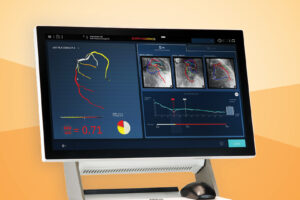Rich Luick of Oceanport never had any symptoms of a potential heart attack or stroke – but little did he know, he was at risk for both.
When Rich turned 65, his cardiologist recommended some baseline testing that included a calcium score test, which uses a CT scan to look for calcium deposits in the coronary arteries. An extremely high result led to a cardiac catheterization procedure to open two arteries with blockages and reduce his risk for a heart attack.
Follow-up testing warranted further examination of his carotid arteries, two major arteries that supply oxygen-rich blood to the brain. Rich was referred to CentraState vascular surgeon Habib Khan, MD, and an ultrasound revealed a 70% blockage in his right carotid artery.
“That’s where the role of careful monitoring comes in, provided there are no symptoms,” explains Dr. Khan. “Continued buildup in a carotid artery can slow blood flow to the brain or dislodge plaque, causing a stroke. If the blockage reaches 80%, the risk of stroke increases significantly. At that point, we get to it before it gets to us.”
Rich continued to have carotid artery ultrasounds every three to six months until last spring, when testing showed that the blockage had increased to 80% and surgery was recommended.
“Dr. Khan spent the time to clearly explain all of my options, including traditional surgery and a newer, less invasive procedure,” says Rich, now 68. “Because he was comfortable and confident in both, I chose the option with the quicker recovery.”
Minimally Invasive Technology
Rich underwent transcarotid artery revascularization (TCAR), a minimally invasive procedure in which Dr. Khan inserted a catheter (tiny tube) into his carotid artery through a small incision above his collarbone. Dr. Khan then placed a stent in the artery, stabilizing the plaque and restoring normal blood flow to the brain. TCAR takes half the time of traditional surgery and typically only requires twilight sedation.
“Because it’s less invasive and the recovery is much faster, TCAR has broadened the spectrum of patients who can be treated for carotid artery disease,” says Dr. Khan, one of the few physicians in the region to offer the procedure. “For example, we’ve been able to treat patients in their 90s who would not be good candidates for open surgery. Plus, we can take on more complex cases while reducing the risk of complications.”
TCAR not only helps prevent future strokes – it also minimizes the risk of stroke during the procedure by protecting the brain from any loosened plaque. This is possible through a specialized system that temporarily reverses blood flow away from the brain and filters out plaque debris, preventing it from reaching the brain.
“It’s a very unique benefit,” adds Dr. Khan. “The chance of any plaque moving toward the brain during the procedure is one of the lowest of all modalities.”
A Speedy Recovery
For Rich, the TCAR procedure went extremely smoothly, despite having postsurgical low blood pressure that required a short hospital stay to ensure it returned to normal.
“I felt great, and the healing went tremendously,” says Rich, who was quickly back to golfing, volunteering and taking daily four-mile walks with his wife, Carol, who has been “his rock” in supporting him throughout his care. “I had the utmost confidence in Dr. Khan and would highly recommend him to anyone.”
Who Should Get Screened for Carotid Artery Disease?
Carotid artery disease often has no symptoms in its early stages, so Dr. Khan recommends talking to your doctor if you have risk factors similar to those for heart disease, such as high blood pressure, high cholesterol, diabetes or a family history of heart disease, stroke or carotid artery disease. Your doctor can listen to the arteries in your neck with a stethoscope or refer you for a carotid ultrasound to screen for carotid artery disease – and early treatment can reduce the risk of stroke.
VASCULAR SURGERY AT CENTRASTATE
Learn more about vascular surgery at CentraState.





